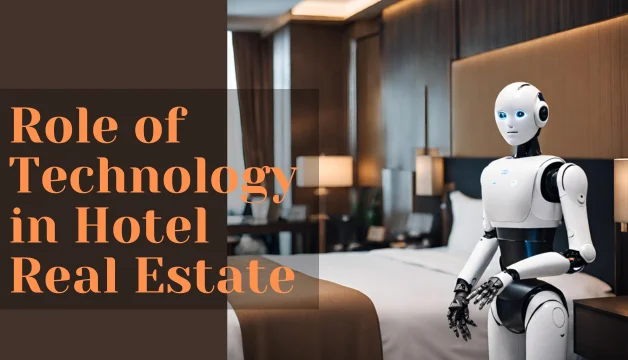In today’s dynamic hospitality landscape, the role of technology in hotel real estate has become more crucial than ever. From enhancing guest experiences to optimizing operational efficiency, technology is reshaping the way hotels operate and adapt to market trends.
The Importance of Technology in the Hospitality Industry
The hospitality industry’s competitiveness relies on technological advancements to meet customer expectations and stay ahead in the market.
1. Technology’s Impact on Guest Experience
Seamless Booking Systems
Modern booking systems provide guests with easy, user-friendly platforms, simplifying the reservation process.
Smart Room Features
Innovative technologies like smart lighting and temperature control enhance the overall guest experience.
Personalized Services
Technology enables hotels to personalize guest services based on preferences, creating memorable stays.
2. Operational Efficiency Through Tech
Property Management Systems
Efficient property management systems streamline hotel operations, from check-in to billing.
Automation in Housekeeping
Automated housekeeping processes improve efficiency and allow staff to focus on guest interactions.
Energy Management Solutions
Implementing energy-efficient technologies reduces costs and aligns with sustainable practices.
3. Data Analytics and Market Insights
Understanding Customer Behavior
Data analytics provide insights into guest preferences, allowing hotels to tailor services accordingly.
Real-time Pricing Strategies
Dynamic pricing strategies based on real-time data enhance revenue management.
Competitor Analysis
Technology aids in monitoring competitors, helping hotels stay competitive in pricing and services.
4. Sustainability in Hotel Real Estate
Green Technology Adoption
Hotels are increasingly adopting eco-friendly technologies to reduce their environmental footprint.
Waste Reduction Measures
Technological solutions help minimize waste and promote sustainable practices.
Cost Savings and Environmental Impact
Sustainable practices not only reduce costs but also contribute positively to the environment.
5. Challenges and Solutions
Cybersecurity Concerns
Hotels must address cybersecurity challenges to protect guest information and maintain trust.
Staff Training and Adaptation
Proper training programs ensure staff can effectively utilize and adapt to new technologies.
Integration Challenges
Integrating various technologies requires careful planning and execution to avoid disruptions.
6. Future Trends
Artificial Intelligence in Hospitality
The real estate industry gains a competitive edge through AI, reaching the right audience, boosting conversions, and creating seamless experiences.
AI-driven tools, such as real estate description generators and virtual property tours, enhance property listings by providing compelling descriptions and immersive experiences for remote property exploration.
Virtual and Augmented Reality Applications
VR and AR technologies provide immersive experiences, attracting tech-savvy guests.
Contactless Technologies
The demand for contactless technologies, from check-ins to room controls, is on the rise.
7. The Role of Mobile Apps
Enhancing Guest Interaction
Mobile apps facilitate direct communication between guests and hotel staff, enhancing the overall experience.
Mobile Check-ins and Check-outs
Contactless check-in and check-out options via mobile apps are gaining popularity.
Loyalty Programs and Push Notifications
Mobile apps support loyalty programs and enable personalized push notifications to engage guests.
8. Adapting to Market Trends
Flexible Business Models
Hotels embracing flexible business models can easily adapt to changing market demands.
Strategic Partnerships
Collaborations with tech providers and other businesses enhance a hotel’s technological capabilities.
Continuous Technological Upgrades
Staying ahead requires continuous investments in technology to meet evolving guest expectations.
9. Case Studies
Successful Integration Stories
Case studies highlight hotels that successfully integrated technology, resulting in improved guest satisfaction.
Positive Impact on Revenue
Real-life examples of how technology positively influenced revenue and market positioning.
Lessons Learned
Key takeaways from hotels that faced challenges in adopting technology provide valuable insights for others.
Conclusion
Recap of Technology’s Influence
Technology’s impact on hotel real estate is transformative, influencing guest experiences and operational efficiency.
Importance of Staying Ahead
Hotels that stay abreast of technological advancements gain a competitive edge in the industry.
Embracing Innovation in Hotel Real Estate
Innovation is key to meeting evolving guest expectations and thriving in the competitive hotel market.
Some FAQs:
Are there any risks associated with adopting AI in the hospitality sector?
While AI offers numerous benefits, hotels must address concerns like data security and ethical considerations.
How do data analytics benefit hotel marketing strategies?
Data analytics provide insights into guest preferences, allowing hotels to tailor marketing strategies effectively.
Are there privacy concerns with smart room features?
Hotels must prioritize guest privacy by implementing robust security measures and transparent policies.







